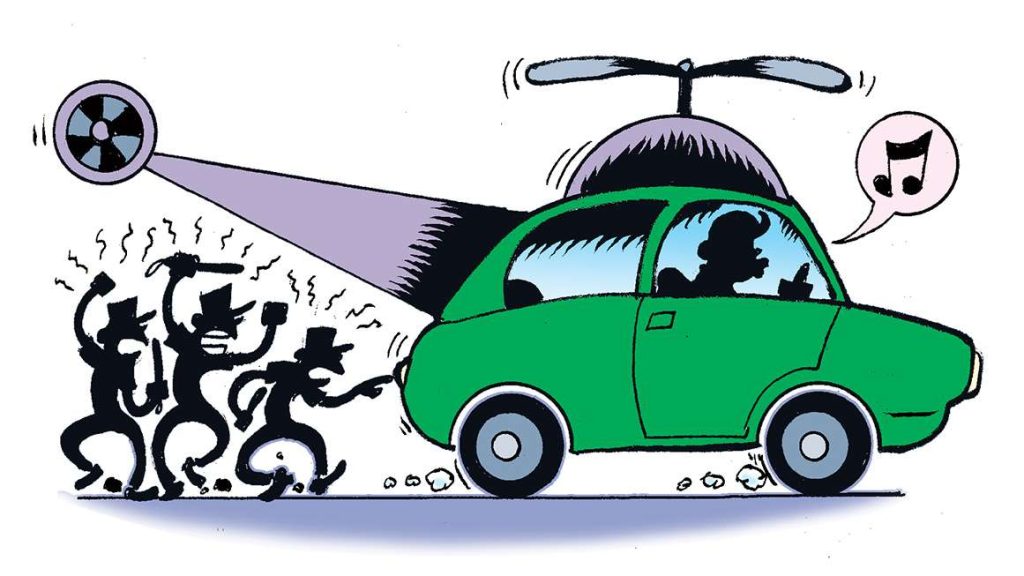In India, Ishwar Deen spent more than two months and 250,000 rupees ($2,995) modifying his car to look like a helicopter, welding a propeller to the top and a boom to the back. The first day he took the car on the road, police seized it for illegal modifications and fined him 2,000 rupees ($24).
Twyla Stallworth of Andalusia, Alabama, called to file a noise complaint against her neighbor; when no police officer ever came, she set off a car alarm to annoy the neighbor, who then called to report her. An officer was then dispatched to the scene and arrested Stallworth—not for the car alarm, but for not showing identification in her own home. Andalusia Mayor Earl Johnson later apologized to Stallworth and said all charges would be dropped. Under Alabama law, officers can demand ID only from someone who is in a public place and has committed or is likely to commit a crime.
(Illustration: Peter Bagge)
In England, the Hastings Borough Council enacted rules banning one person from walking more than six dogs at a time. Those who violate the ordinance face a fine of up to 1,000 pounds ($1,252). The rules also ban dogs from a number of public places.
Sherri Chance’s son called 911 when he saw flames shooting out of the clothes dryer at their home in DeKalb County, Georgia. Even though a fire station was just 2 miles away, he sat on hold for 41 minutes while family members and neighbors tried to battle the growing blaze themselves. Firefighters didn’t arrive until a passing FedEx driver saw the house on fire, drove to the fire station, and alerted them.
(Illustration: Peter Bagge)
The St. Louis County SWAT team knocked down the door to Brittany Shamily’s home, detaining her and her family while they ransacked the place, searching for evidence related to a carjacking. One of the victims told police his AirPods were in the stolen car, and the Find My app seemed to indicate they were in the home. But the app isn’t quite that precise: Police didn’t find any evidence related to the carjacking, but they did find the AirPods in the street nearby.
Officials in Fowlerville, Michigan, agreed to pay $320,000 to settle a lawsuit brought by Ryohei Akima, who was wrongly charged with driving under the influence after a rookie officer misread a Breathalyzer test. Akima blew a 0.02, below the blood alcohol content for a drunk driving charge. But the officer—who told a colleague over the radio, “I have no idea what I’m doing”—read it as 0.22, nearly three times the legal limit. The charges were dropped when a blood test showed Akima was under the limit.
Home invasions by criminals seeking to steal automobiles rose 400 percent last year, according to the Toronto Police Service. One officer advised residents to leave their keys at the front door so they’ll be easier for criminals to find. “They’re breaking into your home to steal your car. They don’t want anything else,” Constable Marco Ricciardi said during a community meeting.
(Illustration: Peter Bagge)
In Nigeria, Chioma Okoli faces up to three years in prison and a fine of 7 million naira (around $5,112) after posting on Facebook that she found a tomato puree made by local company Erisco Foods Limited to be too sweet. Police charged her under the nation’s cybercrimes law with “the intention of instigating people against Erisco Foods.” The company also filed a civil lawsuit against her.
The post Brickbats: July 2024 appeared first on Reason.com.







